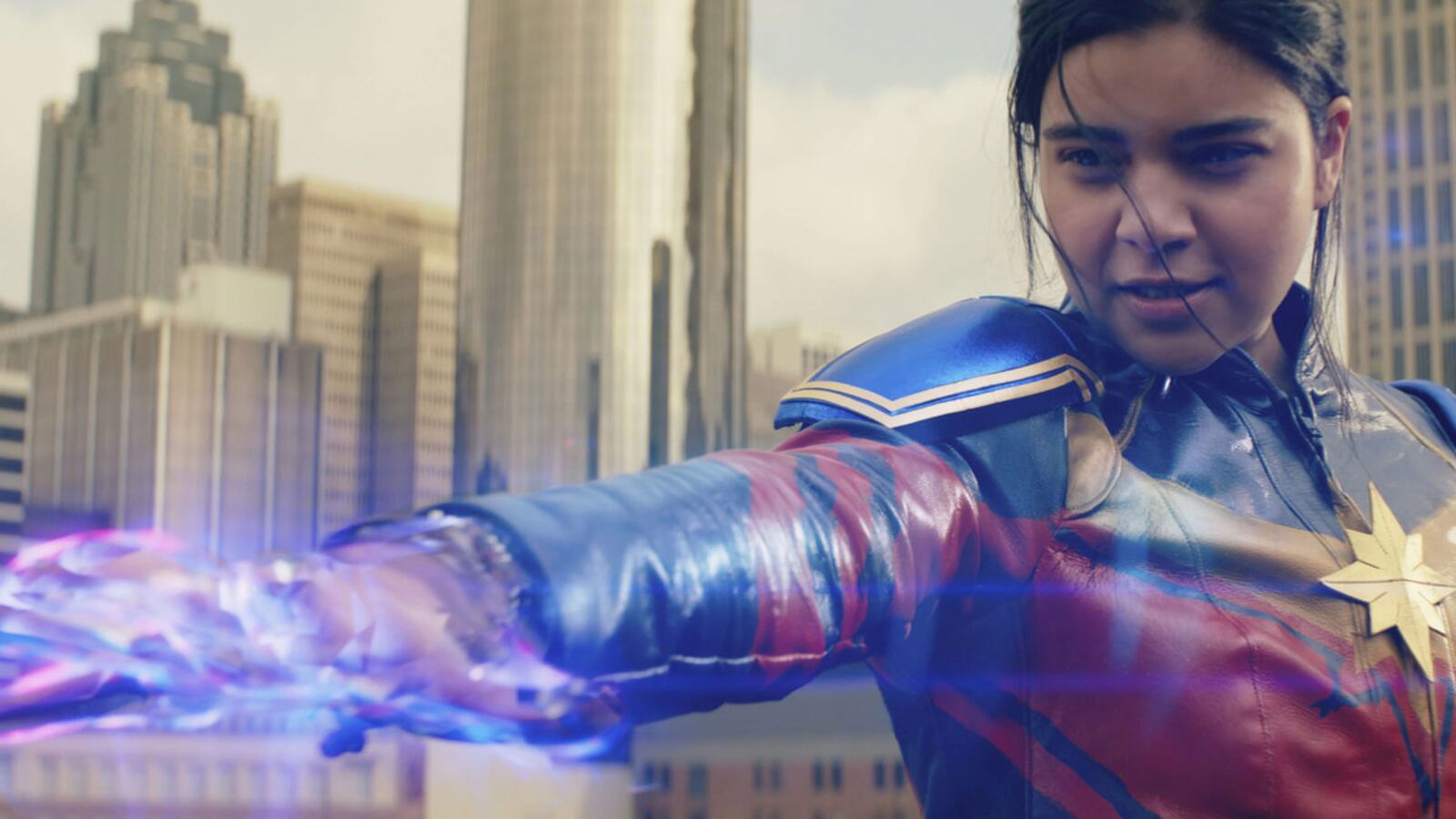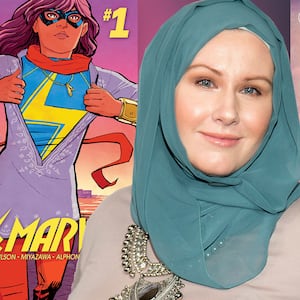I grew up in a Muslim household. There’s a shortened Arabic phrasing I still utter, which is a broad invocation used before you take your first steps, or begin some activity, within Muslim culture: bismillah.
So as soon as I heard one of the characters in Disney+ latest superhero show, Ms. Marvel, say “Remember to say bismillah before you start the car,” I felt seen. And not just seen, but understood, barking that cry of familiarity that comes from private jokes between friends or family.
The moniker “Ms. Marvel” was first used by Carol Danvers and is now used by Kamala Khan. Danvers only took on the moniker in 2012 and the films have only ever associated her with “Captain.” Kamala Khan, however, took over Danver’s powers, with Khan’s own series beginning in 2014, becoming the first Muslim character to headline a Marvel comic.
The Comics
Khan, a Pakistani-American Muslim teenager who lives in New Jersey with immigrant parents, is basically a giant comic-book nerd who doesn’t need to rely on comics to engage with her favorite superheroes (her favorite being Danvers) since, in her universe, superheroes are as real as politicians.

Khan, for various nerd reasons, obtains superhero powers and becomes the kind of hero she obsesses over: she has shapeshifting abilities, can make her body long or big or small, and heals easily. She is wholesome, dorky, and never lets up her love of hero culture, much to the chagrin of—famously—a very grumpy Wolverine.
She is a less irritating Peter Parker. And, much like Parker, her concerns are localized: she’s dealing with teenager things, like high school and relationships and overbearing parents. She is often affected because kids she knows are affected. Her adventures have seen her battle teenage-kidnapping, human/cockatiel hybrids, shadowy government figures, romantic partners who can turn into blue energy, and evil suits.
The character was co-created by a Pakistani-American Muslim woman, Sana Amanat, who is editor and Director of Content and Character Development at Marvel. She also grew up in New Jersey to immigrant parents. The series rose to prominence under the penmanship of co-creator G. Willow Wilson, one of the most accomplished comics writers and herself also a Muslim.
The TV Show
Marvel’s large library of on-screen superheroes is somewhat intimidating. Plots depend on continuity and knowledge of characters from films or shows you may not have seen—some of them not even by Marvel.
However, with Disney+’s Ms Marvel, no knowledge beyond some vague recollection of the Avengers films is necessary (in particular the last two Avengers films).
Ms. Marvel’s showrunner and head writer, Bisha K. Ali, is a British-Pakistani writer who also worked on Disney+’s Loki. Ali has done a remarkable job of capturing the dorkiness, wholesomeness, and authenticity of the comics. Performer Iman Vellani, a Pakistani-Canadian, has brought Khan to life, managing to straddle that careful line between quirky and irritating.
Her responses to everything from irritating parents to superpowers is believable. Ali’s writing of Khan’s family felt like Ali had been present at my childhood home (not least that my mother’s maiden name is Khan), with curries cooking, recitations in Arabic without really knowing their meaning, considerations about the consumption of alcohol, and navigating a mosque that proclaims inclusiveness yet has a screen up to separate men and women.
I almost had to pause it due to laughing when Khan’s mother forces food on her white friend, having already packed the food before he could answer. And she comments on the heat. My own mother would do the same.

I experienced all of this and it was unnerving—then welcome—to see this interspersed with Khan’s adventures. I do not think I’ve ever felt so represented in such a natural way before.
In general, Ali and her team have done a phenomenal job. The writing, as I say, is excellent, with Khan and her friends and family acting like people I know and would encounter in the real world. This is a show where almost everyone has a mouth on them, even food-stall sellers, but it often comes from a place of respect and love.
Muslim culture is front and center, too, in terms of wedding preparations, Eid celebrations, and mosque irritations. Incredibly, Ali also tackles the colorism (and a woman’s decision to wear a hijab) I have seen in my brown community. Kamala’s best friend, Nakia (Yasmeen Fletcher), discusses Nakia herself being “too white for some people and too ethnic for others.”
The show also has a uniquely visual language, brilliantly using the environment itself to be either a canvas or phone screen. Walls portray Khan’s beautiful sketches, flowing across buildings, across vehicles and on to roads. Signs morph into emojis she types in her phone and sends to her friends.
There are clever environmental setups and pay-offs reminiscent of Edgar Wright at his best. For example, at the beginning of the first episode, Khan’s friend makes a gadget for Khan’s father that turns off all the lights. Towards the end of the episode, while she is trying to come up with a cunning plan, her father turns off all the lights by accident. Cut to a close up of Khan, as the one light above her turns on, as the plan comes together.
And this kind of cleverness never relents. It is infused into the show’s DNA. I’ve only had access to the first two episodes but both demonstrated a clear, definitive visual language, carving its identity out from other Marvel TV shows in a bold, confident way.
Importantly, this does not fall into self-indulgence. There’s a clear villain group, a larger story about how exactly Khan gets her powers—diverging greatly from the comics—and what seems to be a hint at the upcoming The Marvels film (this company needs to get better at naming).

Look, Marvel is a lot. Its comics and characters are way too many, its films’ panoramic existence way too much. But I view it as a canvas for stories rather than a universe or corporation. And with Ms. Marvel, we get the benefit of a Pakistani-American Muslim character created by people like her, brought to screen by people like her, with actors like her.
It’s a uniquely culturally Muslim experience I’ve never experienced anywhere else, that not only deserves your attention more than your average Marvel TV show, but demands it. I may be “biased” in terms of audience, but more than anything, I was impressed: Few TV shows carry themselves with the confidence in its identity that Ms. Marvel does, which is all the more striking given its portrayal of a very unrepresented culture and family life.
I also cannot stress how gorgeous and well-produced this show is. Ms. Marvel only has six episodes (which is great). I, for one, will be glued to my TV as soon as they’re out.







